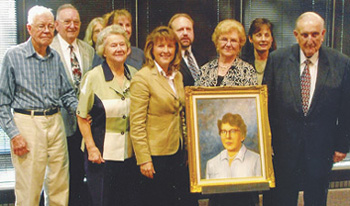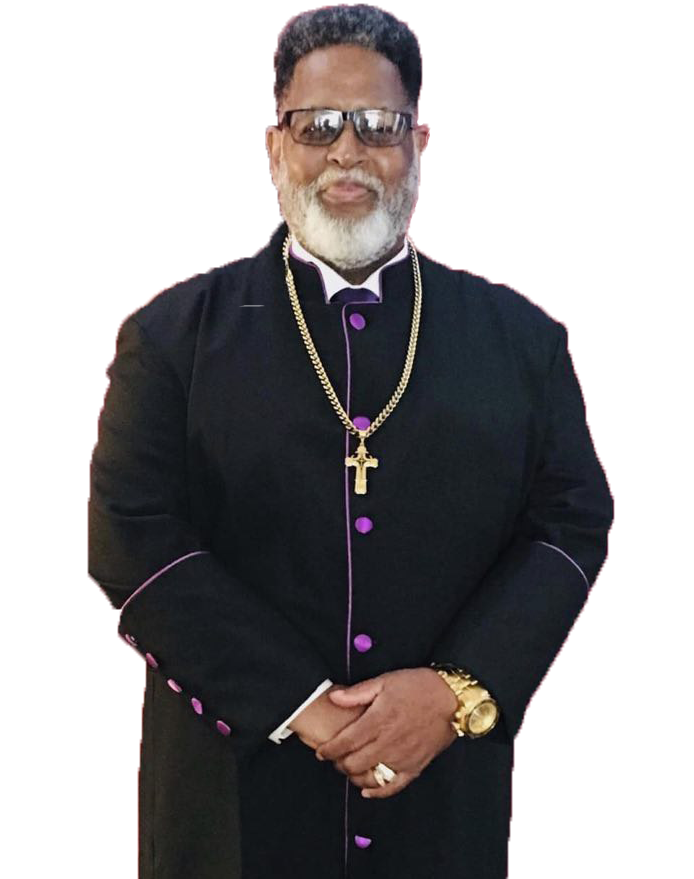
"Remembering Our Marjorie"
News Journal of the Baptist
General Association of Virginia
November 6, 2008
By Fred Anderson, Executive Director, Virginia Baptist Historical Society
Prison chaplains and other missions friends surround the portrait of Marjorie Bailey. Those present included Jack Letien (at far left) who commissioned the portrait; Laura McDaniel, executive director of Virginia WMU; artist Marcella Campbell
Marjorie Lee Bailey was uniquely equipped with God-given gifts for one of the most challenging places of ministry. In 1966 she began service as director of religious activities and chaplain at the Virginia women’s prison in Goochland. In 1977, in addition to this ministry, she also became senior chaplain at the men’s state prison, the ancient and dreaded state penitentiary located at the time across from the Oregon
Hill neighborhood in downtown Richmond. What a church field! What a congregation! What a challenge!
Our Marjorie had become the first woman in America to serve as a chaplain in a male maximum security prison. She had about 1,200 persons in her dual congregations at the men’s and women’s prisons. No timid person need have applied for such a position and Our Marjorie was anything but timid.
Her boss during her prison chaplaincy years was George Ricketts, the former president of the Chaplain Service of the Churches of Virginia, one of the ministries supported in part by Virginia Baptists through the General Association. Actually, Ricketts is quick to maintain that nobody ever pretended to be Our Marjorie’s boss. “She worked with the poor, the brokenhearted, the prisoners, the ill and the bruised,” said Ricketts. “Jesus taught us to give high priority to caring for the poor and powerless, and Marjorie reminded churches, [WMU] circles and classes that ministering to those in prison was an essential part of the Christian mission field.”
Ricketts also remembered Our Marjorie as a collector of stray cats and strangers. She made friends with both species. “She had a special place in her heart for the devilish ones,” remembered Ricketts, referring to the cats. “She had several beautiful cats but she was fondest of the rascals.” The same may be said of many of the folks to whom she ministered.
The late Albert Kitchen, long-time lay leader in the Richmond Association, once observed that Our Marjorie was without prejudice. “Race, color, creed and sex were not barriers in her work. She believed strongly in equal rights for women but also fought for men’s rights.” One of the most notorious of convicted murderers in the men’s prison was converted and baptized by Our Marjorie and it made the Richmond newspapers.
Marjorie Bailey was born in Southwest Virginia, in Abingdon, in 1923; but most of her life was spent in Richmond. She grew up in Woodland Heights Baptist Church in South Richmond and later joined First Baptist Church, Richmond. She had studied at Blue Mountain College in Mississippi as well as at Southwestern Seminary and VCU where she gained book knowledge of clinical pastoral education. By working in the prisons, she could have written a volume herself based upon practical experience.
She also had been a missionary with the SBC’s Home Mission Board in the River Front mission in New Orleans. She returned home to serve as a missionary of the Richmond Baptist Association which always has been in the forefront of social ministry. In the Fifties she worked in what used to be aptly called Good Will Centers: South Richmond and Hillside Baptist centers in Richmond.
In 1972 Our Marjorie sought ordination so that she could serve in the varied roles of ministry, including the administration of the ordinances of communion, baptism and marriage. When Bainbridge Street Baptist Church in Richmond ordained her, she became the first Virginia Baptist woman to be ordained by Virginia Baptists and only the third in the SBC. The ordination did not go unnoticed by those who opposed women’s ordination. One unsigned letter simply typed the Scripture verse which called for women to keep silent in churches. “If they will learn anything,” continued the verse, “let them ask their husbands at home.” Since Our Marjorie had no husband, she assumed that the admonition was not meant for her! Remember that Our Marjorie was not a timid soul!
Our Marjorie saved that unsigned letter but she also treasured all of the notes of commendation. One read: “Miss Bailey, may an old Catholic pray for a conscientious Baptist? No one is more qualified or more sincere in their work than our Chaplain. Wish I could tell [everyone] about you and all you have done and are doing for the girls here at the [prison] farm. Anyway, I am praying for you a Novena to St. Jude who has been of great help to me.” A prisoner once told her: “I am a Jew.” Her quick reply was: “So was Jesus.” It was the beginning of a long and special relationship.
Our Marjorie died too soon. She died 20 years ago at the age of 65. An entire generation has come which knows not Our Marjorie. Jack Letien remembers her and he commissioned a portrait of Marjorie Bailey, which was created by artist Marcella Campbell. In late September, it was unveiled in a special chapel service at the Virginia Baptist Resource Center. The portrait is to be placed at the Virginia Baptist Historical Society.
Among the persons who spoke at the presentation was Hasan Zarif. He said: “I met Chaplain Bailey at the state penitentiary when she first came. At first, some of the men said: ‘Umph, a woman chaplain! She’ll be gone soon!’
“She continued to minister to those men, love those men and respect those men and those same men who said she would not stay were those who helped refurbish the prison chapel.”
Zarif himself was influenced by the remarkable chaplain; and as a prisoner, he served as her assistant. For the last 20 years, he has served as an ordained minister and special projects coordinator for Goodwill Industries and the Chaplain Service. He has been active in the restoration of civil rights for former prisoners when they have been released. Zarif’s very life is a remembrance of the influence of Our Marjorie.
Fred Anderson is executive director of the Virginia Baptist Historical Society and the Center for Baptist Heritage and Studies. He may be contacted at


